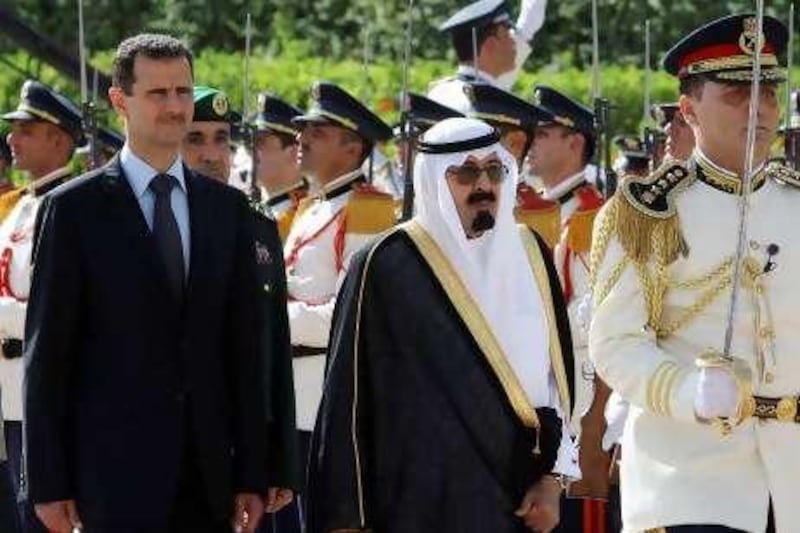DAMASCUS // The Syrian president, Bashar al Assad, and King Abdullah of Saudi Arabia are due in Beirut today, as part of a concerted diplomatic effort to head-off a brewing crisis in Lebanon. Fears are growing that a peace agreement between Lebanese factions, sealed two years ago in Doha, is in jeopardy following claims that Hizbollah, the Shiite Islamist movement, is to be implicated in the assassination of Lebanon's former prime minister Rafik Hariri.
The Hizbollah leader, Hassan Nasrallah, has said he will not accept any of the group's members being indicted by the United Nations tribunal investigating the killing, warning that the militants "know how to defend" themselves. That stance could put his movement, once again, on collision course with supporters of the current Lebanese prime minister, Saad Hariri, son of the murdered former premier.
It was just such a confrontation that pushed Lebanon to the brink of civil war in 2008, before the Doha Accords were signed in May of that year, averting a conflict that had already resulted in street fighting. Syria, a principle supporter of Hizbollah, and Saudi Arabia, which backs Mr Hariri's bloc, were key players in bringing about the political resolution, and this latest flurry of diplomacy is a sign they hope to keep the fragile stability alive.
"The situation in Lebanon is serious," said a Syrian official, speaking on condition of anonymity because he had not been authorised to talk to the press. He confirmed that Mr al Assad and King Abdullah, who arrived in Damascus yesterday afternoon, were meeting to discuss the implications of the UN tribunal's anticipated findings before travelling to Beirut together today for talks with Lebanese political leaders.
"It is a possible source of division in Lebanon and Syria wants to make sure things are not allowed to boil over," the official said. When tensions in Lebanon last peaked two years ago, relations between Riyadh and Damascus were at an all time low. Syria had been widely accused of involvement in the Hariri murder - charges it vehemently denied - with Saudi Arabia one of its leading critics. The assassination triggered a wave of international pressure on Damascus, forcing it to pull its army and security services out of Lebanon, thereby ending a military presence that had lasted almost three decades. Since then, Syria's diplomatic isolation has ended, in part because of its constructive role in the Doha Accords, and political bridges have been rebuilt between Riyadh and Damascus. There has also been a remarkable turnaround in the relationship between Damascus and what had been anti-Syrian groups in Lebanon, led by Saad Hariri himself. He once blamed Mr al Assad of personally ordering the murder of his father, a claim he has since stepped back from. The two men have subsequently held regular meetings - the Lebanese prime minister visiting Damascus four times in the past eight months - apparently forgetting the animosity of the past. Mr Hariri has added his voice to those trying to tamp down the newly inflamed tensions, appealing to all parties to remain calm and insisting that the outcome of the UN tribunal, which has not been made public, should not be preempted. Indictments from the tribunal are not expected to be issued before the end of the year but there has been mounting speculation that Hizbollah members will be named. That theory was dramatically confirmed by Mr Nasrallah himself in a televised address last week, citing Saad Hariri as the source. It was that speech, in which he tarred the UN tribunal as an Israeli plot, that again raised the spectre of Lebanon's simmering sectarian discord. In an unprecedented defence of its work, the tribunal released a statement yesterday denying any allegations of impropriety. "Experience of other international tribunals has shown that the results of the work of such institutions speak for themselves and contradict the unsubstantiated allegations of hostile interference," Fatima Issawi, spokeswoman for the tribunal, told Reuters in written answers to e-mailed questions. "We are convinced that this will also happen in the case of the Special Tribunal for Lebanon (STL)." Today's meetings in Beirut are expected to include private discussions between Mr al Assad, King Abdullah and Lebanon's president, Michel Sleiman, addressing the renewal of sectarian tensions. Unconfirmed reports indicate the emir of Qatar, Sheikh Hamad bin Khalifa al Thani, may also be in Beirut, which, if true, would mean the key architects of the 2008 Doha Accords are present. Today's trip to Beirut is the first by Mr al Assad since the 2005 killing of Rafik Hariri.
psands@thenational.ae
mprothero@thenational.ae
* Mitchell Prothero reported from Beirut





